- Home
- Jason Starr
The Craving Page 4
The Craving Read online
Page 4
Whenever he started running, he felt instantly invigorated and energized. He loved the cold air against his face and how he moved effortlessly, his feet seeming to glide, like a hovercraft, just above the ground. And while he knew this behavior wasn’t normal, that it was a symptom of his transformation, he couldn’t stop himself from the need to run, to let loose. The need was a part of him now, an instinct, and how was he supposed to resist his instincts, especially the ones that were so pleasurable?
He cut over to his left at full speed, easily clearing a short fence and running along a grassy area. He slowed as he crossed West Drive, where many joggers and bikers were out, and then headed over a footbridge and along a path into the Ramble, the woodsy area in the middle of the park. The Ramble was the closest you could come in Manhattan to being in the wilderness. Old-fashioned lampposts lit up the path and, although he didn’t see anyone around, he sensed the presence of humans. He wasn’t sure how he was able to sense this, but he just could, and without giving it any additional thought he darted into the woods. It was pitch-black, but he somehow knew where all of the trees, fallen branches, and other obstructions were and how to avoid them. It was as if he had his own built-in GPS.
He continued, zigzagging through the woods, with seemingly boundless energy. Going uphill was as easy as going downhill, and he was experiencing so much joy he didn’t want it to ever stop. Now he understood why dogs seemed so unabashedly happy when they ran around unleashed, and why wild horses loved to chase one another, and why dolphins leaped out of the ocean. It was amazing how it felt to exert energy for no reason, just for the sheer joy of it. What he was experiencing was so far beyond the rush from endorphins, the runner’s high that some people feel at the peak of strenuous workouts. If people felt the way he did right now from physical activity, the whole world would be addicted to exercise. No one would be able to sit at a desk in an office or on a couch, watching TV or playing video games, and there would be no such thing as obesity. Everyone would be out running fanatically, burning thousands of calories a day.
Simon jumped over a stream and was heading up another hill when he sensed someone nearby. Normally, Simon would have simply altered course to avoid the person, probably using the same mechanism that bears and other wild animals use to avoid humans in the woods, but there was something different about this odor. To confirm his suspicions, Simon stopped and listened closely and breathed deeply, somehow able to decipher the specific scent amid the thousands of scents in Central Park. Sure enough, he was convinced that he wasn’t imagining this—there was definitely another werewolf in the Ramble.
Was it Michael, one of the dads Simon had met at the playground in Battery Park last month? Simon had hit it off with Michael and his friends Charlie and Ramon, until he’d found out that Michael was actually a werewolf who wanted to bring the guys into his “pack.” Michael had killed at least a few people, and the last time Simon had seen him they’d fought as werewolves on the rooftop of the old brewery in Brooklyn that Michael owned. That was the same night Simon had killed Olivia, the crazed female werewolf who was attacking him and the guys. Simon had been hoping never to see Michael again and to deal with his situation alone, but what if Michael feared that Simon would go to the police?
Well, if Michael was stalking him in the Ramble, Simon wanted to make the first move. Without giving it much thought, or considering any possible consequences, he took off in the direction of the scent. It was strongest down toward the lake, where there were also the intense aromas of mulch, algae, and whatever weeds were growing in the water and nearby. Simon could have cornered the werewolf near the shoreline, but he had to alter his course to avoid a couple of humans—a man and a woman—who were in his path. When he picked up the scent again it was fainter, and he knew the werewolf had probably realized that Simon had caught on to him—it was definitely a male werewolf; the odor was particularly pungent—and was probably sprinting away, toward the center of the park. Simon increased his speed as well, going faster than he had all evening, practically gliding above the rugged ground. He didn’t seem to be closing the gap very much, though, if at all, and then he reached the park’s East Drive and he had to reduce his speed to a normal jogger’s pace as there were many people around.
Simon stopped at the edge of the road, trying to pick up the scent. A family of tourists—they looked European—were passing by in a horse-drawn carriage, gazing at him with wide-eyed expressions, probably wondering why this scruffy-faced man was looking around frantically in every which direction. There were so many human scents in the area that Simon found it extremely difficult to hone in on the scent he was pursuing. He thought it was coming from downtown, but it was so faint now, it had almost vanished, and then it set in that it was too late.
The werewolf was gone.
THREE
Almost every night when NYPD homicide detective Geri Rodriguez got off work, usually at one or two in the morning, she went to the Midnight Express diner on Tenth Avenue in Hell’s Kitchen, around the corner from her apartment on West Forty-eighth, and sat at the counter and had black coffee, a BLT, and a bowl of split pea soup. The guy who worked at the counter, Carlos, was Puerto Rican like Geri and usually asked her a couple of questions in Spanglish—Catch any banditos esta noche? Still keeping la ciudad safe?—then left her alone. Most customers left her alone too. Though Geri was pretty and petite—she claimed she was five two, but was actually barely five one—most guys picked up on the “don’t mess with me, I’m a cop” vibe that, after twelve years on the force, three as a homicide detective, she’d learned to exude effortlessly. So she’d just eat her food, read the Post or News if someone had left a copy, and be on her way.
But tonight when the two drunk club kids, both maybe twenty years old, came in, she had a feeling this wouldn’t be an uninterrupted meal.
Sure enough, as the kids, reeking of alcohol, were passing by behind her, the skinny black one leaned in close and said, “Waitin’ for me all night, right, baby?” causing his Asian friend to burst out laughing. Then they sat directly next to her, even though she’d been the only one sitting at the counter and all the stools were free.
Geri looked at Carlos, but of course Carlos wasn’t going to say anything; why would he jump in to protect a cop? To Carlos, this was just theater, something to hang back and watch, and make a boring work night a little more interesting. Two drunk kids were harassing a cop, a female cop; he probably couldn’t wait to see what happened next.
Geri had already had a bad day. Her investigation of a murder in Washington Heights was going nowhere, and a potential witness, a homeless man, had spit in her face during questioning, and she’d had to spend two hours getting screened for TB, so the last thing she needed now was trouble from a couple of drunk punks. She ignored the kids, taking a bite of her BLT, hoping they would do the smart thing and leave her alone.
But no luck there. In her peripheral vision, Geri could see the black kid looking right at her. Then she heard him whisper to his friend something that included the word nasty and his friend say, “Go ’head” and “Just do it, man”—and then the black kid said to her, “Yo, how’s that soup, bitch?”
Geri looked right at him for the first time. The kid was smiling in a cocky way—yeah, he thought he was a player all right. Eyes glassy, bloodshot—definitely drunk, probably high too. The friend, egging him on, was also grinning.
Geri held his gaze for a long time, then said, “The soup’s great. How’s your boyfriend?”
The black kid stopped grinning, suddenly looking angry, shown up, but his friend was laughing, in a fake way, saying, “Ha, ha, ha. Damn. Oh, man. Oh … Oh.”
The black kid wasn’t laughing, though. “You got a mouth on you, don’t you, bitch?” he said. “That’s okay, I like that. Dirty mouth’s better than a clean mouth any day. Lot more fun anyway.”
Geri looked over at Carlos, who was still near the other end of the counter, relaxed, watching, like he could’ve been munching from
a bag of popcorn.
“I’d suggest you get the hell out of here now,” Geri said.
The Asian kid laughed harder, as if saying to his friend, You gonna take that?
“You suggest?” the black kid said. “Ha, ha, ha, that’s funny. You know what I suggest? I suggest you shut your bitch-ass mouth ’less you down on your knees, looking up at me, like you’re gonna be later.”
Geri glared at him and said, “This is the last time I’m telling you.”
The Asian kid, still laughing, said, “Check it out, J, she’s your teacher now. She’s gonna make you stay late after class.”
“You my teacher now, bitch?” the black kid said, putting a hand on Geri’s ass. “You ready to bend over your desk for me?”
On me, Geri was off the stool and had grabbed his hand, twisting it behind his back all the way up to his neck, and then forcing his head, face down, into her still-hot bowl of split pea soup.
Over the kid’s muted wailing, Geri said, “I think you’re the one who’s gonna be doing the bending over tonight.”
The Asian kid got off his stool, ready to help his friend, when Geri angled her hip out so he could see her holster and her gun inside it. The Asian kid’s eyes widened and he backed away. He said, “Yo, man, she’s a cop.”
Geri said to the groaning black kid, “You’re gonna keep your hands off women, right?”
The kid was gargling into the soup. Geri knew she was going too far, but she’d had a bad day and, somehow, this was making her feel better.
“I can’t hear you,” she said, pushing his face down harder.
Now the gargles were more agonized; he was probably straining to breathe. Geri lifted his head.
“Crazy bitch,” he said. “I got rights.”
She forced his head back into the soup, then lifted it again.
“Okay, okay, whatever, just chill,” he said. “Just chill.”
Geri gave him one last taste of the soup, then yanked him back away from the counter and let go of him. He stumbled backward, wiping soup from his face with his fingers.
“I’m gonna sue your ass,” he said.
“You’ve got ten seconds to get out of here,” Geri said, “or you can talk about your lawsuit with the judge when you’re being arraigned tonight.”
She wasn’t planning to bring him in; she just wanted to scare him.
He looked like he was about to go after Geri. She knew it was just for show—drunk punks were usually all talk, no action—but she was ready to defend herself just in case.
But then the Asian kid grabbed his friend and said, “J, c’mon, let’s just get outta here, man.”
“Let go of me, man,” he said, as if trying to break free, to go after Geri. Yeah, right.
“J,” the Asian kid said.
After a long icy glare, the black kid said, “C’mon,” and then the two kids left the diner.
Unfazed, Geri continued eating her BLT. Carlos cleaned up the spilled soup and brought a fresh bowl without saying a word.
Later, when Geri was leaving the diner, and while she was walking back to her apartment, and especially entering the walk-up, no-doorman building, she looked back over her shoulder to see if the kids were following her. She didn’t think they’d be looking for any more trouble, but she knew from experience that making assumptions about people was always a bad idea. She just hated that she was in this position, that she had to be concerned, but that was just the way it was. She was a cop, yeah, but she was still a woman.
In her apartment, while she was bolting her door and pulling down the security bar, her cats came over and were purring and meowing, rubbing against her legs.
“Mommy’s home,” Geri said, flicking on the light.
The cats were Havana Brown males with chocolate coats, so she’d named them Willy and Wonka.
“How you guys doing?” she said, reaching down and rubbing them under their necks. “Miss me?”
Geri wasn’t a cat person. She’d gotten them only because there had been a mouse problem in the building, and the brother of a cop she knew told her about a friend in the Village who had some cats to give away. Geri didn’t think it was fair to have just one, with her usually gone all day, so she’d gotten the pair.
At first Geri had regretted getting them, hating having to change the litter and chase them out of her bed at night, but she’d gotten used to having the little guys around. They were good cats and didn’t demand much from her. They liked to be fed, petted once in a while, and then they left her alone. As Geri sometimes joked to her friends, “They’re the perfect men.”
Actually the cats had been the only males in Geri’s apartment lately, but she didn’t have a problem with that. Unlike some single women who were afraid to be alone, Geri was perfectly content not being in a relationship, and she intended to keep it that way. At work, she used to get hit on all the time by cops, lawyers, prosecutors, even judges. Geri didn’t want to get involved with anyone she worked with, so she blew off all the guys, and then rumors started going around that she was a dyke. Men and their egos—if a woman wasn’t interested she had to be gay, right? But Geri didn’t mind. If she told people she was straight, she’d be hit on constantly. Besides, the gay rumor gave her more time to focus on her true love—police work.
Geri came from a family of female cops. Her grandmother, God rest her, was a prison guard at Wallkill in the sixties and seventies, and then her mother was a cop in the Bronx, where Geri grew up. Geri always knew she’d be a cop one day, but she had bigger dreams—to be a detective. She’d seen the glass ceiling hold her mother and grandmother back, but she was determined not to let it stop her. She worked her ass off, working OT, determined to be the best patrol cop in the city, and volunteered to work in narcotics. Three years ago, when she’d been just thirty-four, she’d made detective at the 34th Precinct, and then last year she had moved up a grade to homicide detective at Manhattan North.
Geri’s job was her husband. Even when she wasn’t working, she was thinking about work or dreaming about it. When she was in the middle of a case nothing else mattered; it took over her whole life. She barely had time to sleep or eat, so how was a man supposed to fit in?
After Geri fed Willy and Wonka and gave them fresh water, she got ready for bed. Washing her face—she didn’t wear much makeup; just lipstick, a little blush—she had an unsettled feeling that she got when she had unfinished business. Was it the incident with the kids at the diner? No, they were just a couple of punks and Geri wasn’t concerned about them. The Washington Heights murder case was frustrating because she hadn’t been able to get Carlita Morales, the only known witness, to cooperate with the investigation, but she didn’t think that was it either. Then, when she got in bed, it hit her—it was the phone conversation she’d had earlier with Robert Mangel from the 19th Precinct, the detective in charge of the Olivia Becker disappearance case.
Olivia Becker was a successful thirty-eight-year-old woman who lived on the Upper East Side and owned her own graphic design company in midtown. About three weeks ago her co-workers had reported that after “behaving oddly” at work one afternoon, she hadn’t shown up the next day and they’d been unable to contact her. The police had opened an official missing-person investigation but hadn’t made any progress in the case. There was no credit card activity and no evidence that she’d left the city. After that afternoon at work, there was a report that she’d been seen at a bar on Thirty-fifth Street, and there was a possible sighting downtown, near Chinatown, but aside from that it was as if she’d disappeared.
Geri wasn’t working the case, and it probably wouldn’t have caught her interest at all if it weren’t for one detail. A couple of weeks before she’d disappeared, Becker had started dating a guy named Michael Hartman whom Geri had questioned as a possible witness in a couple of strange wolf-related deaths in the New York City area. Hartman wasn’t a suspect in the cases, but he had given an alibi to a person of interest in the case, Simon Burns, an ad exec who lived on
Columbus Avenue on the Upper West Side. While the police had cleared Hartman in Becker’s disappearance, his possible involvement had caught Geri’s attention. The way she saw it, she’d questioned this guy and then a few days later his girlfriend disappeared. Coincidence? Maybe, but it still made Geri feel unsettled.
Getting updates on the investigation hadn’t been easy. The first time she’d contacted Mangel, he hadn’t even bothered to return her call. He could’ve been busy, hadn’t gotten around to calling back, or it had slipped his mind. Or maybe he had a problem with another detective, especially a female detective, moving in on his turf. Not that Geri was actually moving in, but still.

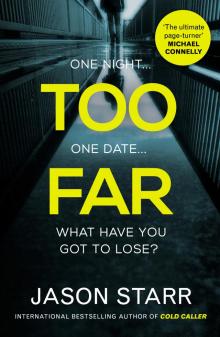 Too Far
Too Far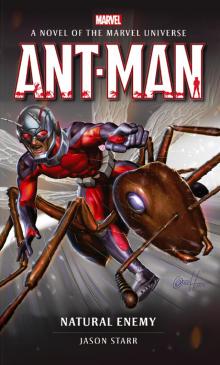 Ant-Man
Ant-Man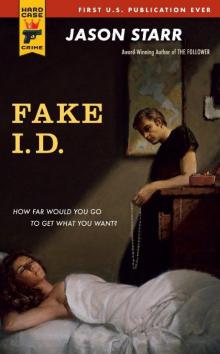 Fake I.D.
Fake I.D. The Pack
The Pack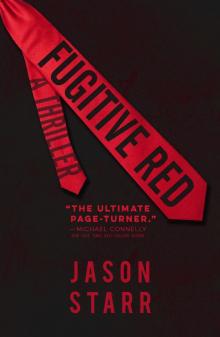 Fugitive Red
Fugitive Red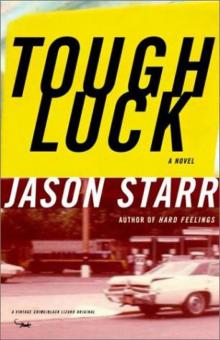 Tough Luck
Tough Luck The Follower
The Follower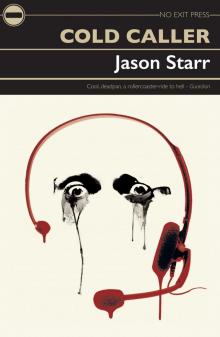 Cold Caller
Cold Caller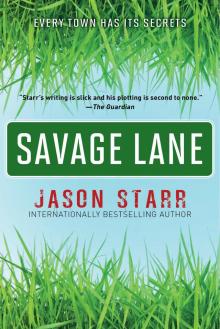 Savage Lane
Savage Lane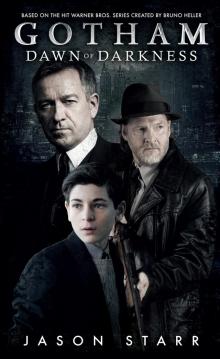 Gotham
Gotham Hard Feelings: A Novel
Hard Feelings: A Novel The Craving
The Craving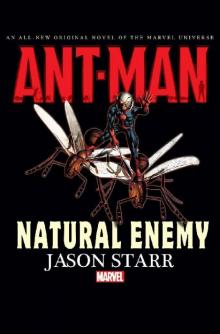 12 Ant-Man Natural Enemy
12 Ant-Man Natural Enemy Twisted City
Twisted City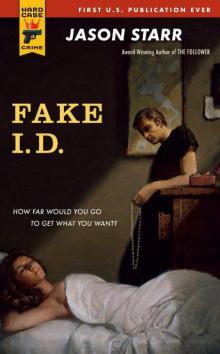 Fake I.D. hcc-56
Fake I.D. hcc-56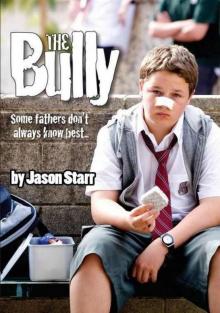 The Bully
The Bully Panic Attack
Panic Attack